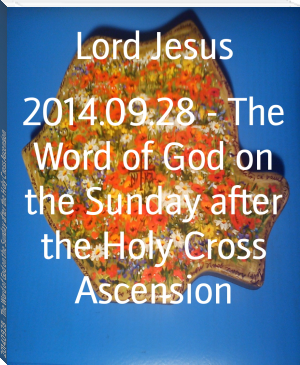2014.09.28 - The Word of God on the Sunday after the Holy Cross Ascension - Lord Jesus (reading e books .txt) 📗

- Author: Lord Jesus
Book online «2014.09.28 - The Word of God on the Sunday after the Holy Cross Ascension - Lord Jesus (reading e books .txt) 📗». Author Lord Jesus
28-09-2014.
Text emphasis in bold belong to the redactor (editor).
You can see more documents containing the Word of God here:
https://drive.google.com/folderview?id=0B0VNo1LgWPpsNklEUnJSek8xdFk&usp=sharing#list
[1] God’s Word in „Holy Citadel New Jerusalem” monastery, Glodeni – Romania, redactor note.
[2] Translated by I.A.
[3] The church year begins, according to the calendar of the Orthodox Church, on September 1 - https://en.wikipedia.org/wiki/Liturgical_year, r.n.
[4] Old Style (O.S.) and New Style (N.S.) (http://en.wikipedia.org/wiki/Old_Style_and_New_Style_dates) are sometimes used with dates to indicate either whether the start of the Julian year has been adjusted to start on 1 January (N.S.) even though documents written at the time use a different start of year (O.S.), or whether a date conforms to the Julian calendar (O.S.), formerly in use in many countries, rather than the Gregorian (N.S.)
The Church Calendar (in Romania) up to 1924 was the same as that of Nicaea, based on severe apostolic canons, but in 1924, the Scripture of the prophet Daniel was fulfilled: «the people made bold to even change the times», when the primate metropolitan - of that time, Miron Cristea, (Primate metropolitan = (in the past) a title given to the first metropolitan of a country; today it would be equal to that of a patriarch) introduced the Gregorian Calendar (Catholic) as result of a „pan-Orthodox” congress that took place in 1923, in Constantinople. At that congress, the patriarch of that time, Meletie, proposed the acceptance of the „revised” Julian Calendar, (http://en.wikipedia.org/wiki/Revised_Julian_calendar) which was in accord with the Catholic one for a period up to the year 2800 and „it was allowing that all the feasts to be celebrated at the same time with those of other confessions”. «… and he shall wear out the saints of the Most High and he shall think to change the times and the law…» (Daniel 7/25), r.n.
[5] The church year starts on 1st September (the New Church Year) and ends on 31st August. According to the Jewish tradition, on a day like this God started His work of the creation of the world and our Savior started His activity of the preaching of the Gospel.
The church year is not identical with the liturgical year. As distinct from the church year, the liturgical year starts on the Passover day.
The New Church Year was founded at the Ecumenical Synod I from Nicaea, when it was decided to be celebrated on 1st September, r.n.
Imprint
Publication Date: 06-17-2019
All Rights Reserved





Comments (0)